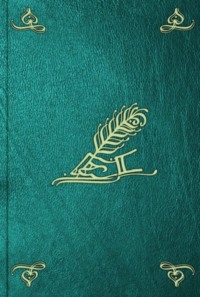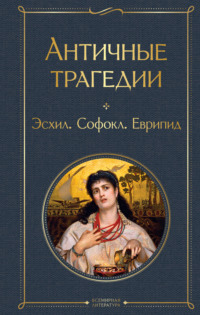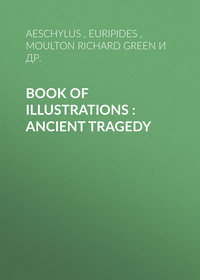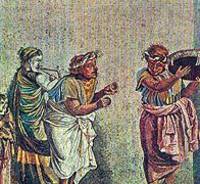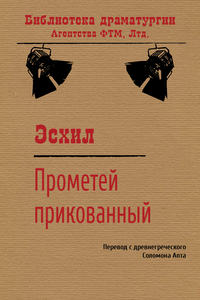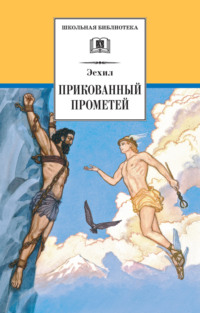 полная версия
полная версияÆschylos Tragedies and Fragments
EUMENIDES
DRAMATIS PERSONÆPythian Priestess
Apollo
Athena
Ghost of Clytæmnestra
Orestes
Hermes
Chorus of the Erinnyes
Athenian Citizens, Women, and Girls
ARGUMENT. – The Erinnyes who appeared to Orestes after the murder of Clytæmnestra made his life miserable, and drove him without rest from land to land. And he, seeking to escape them, had recourse to the Oracle of Apollo at Delphi, believing that he who had sent him to do the work of vengeance would also help to free him from this wretchedness. But the Erinnyes followed him there also, and took their places even within the holy shrine of the Oracle, and while Orestes knelt on the central hearth as a suppliant, they sat upon the seats there, and for very weariness fell asleep.
EUMENIDES
Scene. —The Outer Court of the Oracle at Delphi. Inner shrine inthe background, with doors leading into it Enter the Pythian PriestessPyth. First, with this prayer, of all the Gods I honourThe primal seeress Earth, and Themis next,466Who in due order filled her mother's place,(So runs the tale,) and in the third lot named,With her good-will and doing wrong to none,Another of the Titans' offspring sat,Earth's daughter Phœbe, and as birthday giftShe gives it up to Phœbos,467 and he takesHis name from Phœbe. And he, leaving thenThe pool468 and rocks of Delos, having steeredTo the ship-traversed shores that Pallas owns,Came to this land and to Parnassos' seat:And with great reverence they escort him on,Hephæstos' sons, road-makers,469 turning thusThe wilderness to land no longer wild;And when he comes the people honour him,And Delphos too,470 chief pilot of this land.And him Zeus sets, his mind with skill inspired,As the fourth seer upon these sacred seats;And Loxias is his father Zeus's prophet.These Gods in prologue of my prayer I worship;Pallas Pronaia471 too claims highest praise;The Nymphs adore I too where stands the rockKorykian,472 hollow, loved of birds and hauntOf Gods. [And Bromios473 also claims this place,Nor can I now forget it, since the timeWhen he, a God, with help of Bacchants warred,And planned a death for Pentheus, like a hare's.474Invoking Pleistos'475 founts, Poseidon's might,And Zeus most High, supreme Accomplisher,I in due order sit upon this seatAs seeress, and I pray them that they grantTo find than all my former divinationsOne better still. If Hellas pilgrims sends,Let them approach by lot, as is our law;For as the God guides I give oracles.476[She passes through the door to the adytum,and after a pause returns trembling andcrouching with fear, supporting herselfwith her hands against the walls andcolumns. The door remains open, andOrestes and the Erinnyes are seen in theinner sanctuaryDread things to tell, and dread for eyes to see,Have sent me back again from Loxias' shrine,So that strength fails, nor can I nimbly move,But run with help of hands, not speed of foot;A woman old and terrified is nought,A very child. Lo! into yon recessWith garlands hung I go, and there I seeUpon the central stone477 a God-loathed man,Sitting as suppliant, and with hands that drippedBlood-drops, and holding sword but newly drawn,And branch of olive from the topmost growth,With amplest tufts of white wool meetly wreathed;For this I will say clearly.478 And a troopOf women strange to look at sleepeth there,Before this wanderer, seated on their stools;Not women they, but Gorgons479 I must call them;Nor yet can I to Gorgon forms compare them:I have seen painted shapes that bear awayThe feast of Phineus.480 Wingless, though, are these,And swarth, and every way abominable.They snort with breath that none may dare approach,And from their eyes a loathsome humour pours,And such their garb as neither to the shrineOf Gods is meet to bring, nor mortal roof.Ne'er have I seen a race that owns this tribe,Nor is there land can boast it rears such brood,Unhurt and free from sorrow for its pains.Henceforth be it the lot of Loxias,Our mighty lord, himself to deal with them:True prophet-healer he, and portent-seer,And for all others cleanser of their homes. Enter Apollo from the inner adytum, attended by HermesApol. [To Orestes.] Nay, I'll not fail thee, but as close at handWill guard thee to the end, or though far off,Will not prove yielding to thine adversaries;And now thou see'st these fierce ones captive ta'en,These loathly maidens fallen fast in sleep.Hoary and ancient virgins they, with whomNor God, nor man, nor beast, holds intercourse.They owe their birth to evils; for they dwellIn evil darkness, yea in TartarosBeneath the earth, and are the hate and dreadOf all mankind, and of Olympian Gods.Yet fly thou, fly, and be not faint of heart;For they will chase thee over mainland wide,As thou dost tread the soil by wanderers tracked,And o'er the ocean, and by sea-girt towns;And fail thou not before the time, as broodingO'er this great toil. But go to Pallas' city,And sit, and clasp her ancient image481 there;And there with judges of these things, and wordsStrong to appease, will we a means deviseTo free thee from these ills for evermore;For I urged thee to take thy mother's life.Orest. Thou know'st, O king Apollo, not to wrong;And since thou know'st, learn also not to slight:Thy strength gives full security for act.Apol. Remember, let no fear o'ercome thy soul;And [To Hermes] thou, my brother, of one father born,My Hermes, guard him; true to that thy name,Be thou his Guide, true shepherd of this man,Who comes to me as suppliant: Zeus himselfReveres this reverence e'en to outcasts due,When it to mortals comes with guidance good.482[Exit Orestes led by Hermes. Apollo retires within the adytum. The Ghost of Clytæmnestrarises from the groundClytæm. What ho! Sleep on! What need of sleepers now?And I am put by you to foul disgraceAmong the other dead, nor fails reproachAmong the shades that I a murderess am;And so in shame I wander, and I tell youThat at their hands I bear worst form of blame.And much as I have borne from nearest kin,Yet not one God is stirred to wrath for me,Though done to death by matricidal hands.See ye these heart-wounds, whence and how they came?Yea, when it sleeps, the mind is bright with eyes;483But in the day it is man's lot to lackAll true discernment. Many a gift of mineHave ye lapped up, libations pure from wine,484And soothing rites that shut out drunken mirth;And I dread banquets of the night would offerOn altar-hearth, at hour no God might share.And lo! all this is trampled under foot.He is escaped, and flees, like fawn, away;And even from the midst of all your toilsHas nimbly slipped, and draws wide mouth at you.Hear ye; for I have spoken for my life:Give heed, ye dark, earth-dwelling Goddesses,I, Clytæmnestra's phantom, call on you.[The Erinnyes moan in their sleepMoan on, the man is gone, and flees far off:My kindred find protectors; I find none.[Moan as beforeToo sleep-oppressed art thou, nor pitiest me:Orestes, murderer of his mother, 'scapes.[Noises repeatedDost snort? Dost drowse? Wilt thou not rise and speed?What have ye ever done but work out ill?[Noises as beforeYea, sleep and toil, supreme conspirators,Have withered up the dreaded dragon's strength.Chor. [starting up suddenly with a yell.] Seize him, seize, seize, yea, seize: look well to it.Clytæm. Thou, phantom-like,485 dost hunt thy prey, and criest,Like hound that never rests from care of toil.What dost thou? (to one Erinnys.) Rise and let not toil o'ercome thee,Nor, lulled to sleep, lose all thy sense of loss.Let thy soul (to another) feel the pain of just reproach:The wise of heart find that their goad and spur.And thou (to a third), breathe on him with thy blood-flecked breath,And with thy vapour, thy maw's fire, consume him;Chase him, and wither with a fresh pursuit.Leader of the Chor. Wake, wake, I say; wake her, as I wake thee.Dost slumber? Rise, I say, and shake off sleep.Let's see if this our prelude be in vain.Strophe IPah! pah! Oh me! we suffered, O my friends…Yea, many mine own sufferings undeserved…We suffered a great sorrow, full of woe,An evil hard to bear.Out of the nets he's slipped, our prey is gone:O'ercome by sleep I have my quarry lost.Antistrophe IAh, son of Zeus, a very robber thou,Though young, thou didst old Goddesses ride down,486Honouring thy suppliant, godless though he be,One whom his parents loathe:Thou, though a God, a matricide hast freed:Of which of these acts can one speak as just?Strophe IIYea, this reproach that came to me in dreamsSmote me, as charioteerSmites with a goad he in the middle grasps,Beneath my breast, my heart;'Tis ours to feel the keen, the o'er keen smart,As by the public scourger fiercely lashed.Antistrophe IISuch are the doings of these younger Gods,Beyond all bounds of rightStretching their power… A clot of blood besmearedUpon the base, the head…Earth's central shrine itself we now may seeTake to itself pollution terrible.Strophe IIIAnd thou, a seer, with guilt that stains thy hearthHast fouled thy shrine, self-prompted, self-impelled,Against God's laws a mortal honouring,And bringing low the FatesBorn in the hoary past.Antistrophe IIIMe he may vex, but shall not rescue him;Though 'neath the earth he flee, he is not freedFor he, blood-stained, shall find upon his headAnother after me,Destroyer foul and dread.[Apollo advances from the adytum and confrontsthemApol. Out, out, I bid you, quickly from this temple;Go forth, and leave this shrine oracular,Lest, smitten with a serpent winged and bright,Forth darted from my bow-string golden-wrought,Thou in sore pain bring up dark foam, and vomitThe clots of blood thou suck'dst from human veins.This is no house where ye may meetly come,But there where heads upon the scaffold lie,487And eyes are gouged, and throats of men are cut,And mutilation mars the bloom of youth,Where men are maimed and stoned to death, and groanWith bitter wailing, 'neath the spine impaled;Hear ye what feast ye love, and so becomeLoathed of the Gods? Yes, all your figure's fashionPoints clearly to it. Such as ye should dwellIn cave of lion battening upon blood,Nor tarry in these sacred precincts here,Working defilement. Go, and roam afieldWithout a shepherd, for to flock like thisNot one of all the Gods is friendly found.Chor. O king Apollo, hear us in our turn:No mere accomplice art thou of these things,But guilty art in full as principal.Apol. How then? Prolong thy speech to tell me this.Chor. Thou bad'st this stranger be a matricide.Apol. I bade him to avenge his sire. Why not?Chor. Then thou did'st welcome here the blood just shed.Apol. I bade him seek this shrine as suppliant.Chor. Yet us who were his escort thou revilest.Apol. It is not meet that ye come nigh this house.Chor. Yet is this self-same task appointed us.Apol. What function's this? Boast thou of nobler task?Chor. We drive from home the murderers of their mothers.Apol. What? Those who kill a wife that slays her spouse?Chor. That deed brings not the guilt of blood of kin.488Apol. *Truly thou mak'st dishonoured, and as nought,The marriage-vows of Zeus and Hera great;And by this reasoning Kypris too is shamed,From whom men gain the ties of closest love.For still to man and woman marriage bed,Assigned by Fate and guided by the Right,Is more than any oath. If thou then dealSo gently, when the one the other slays,And dost not even look on them with wrath,I say thou dost not justly chase Orestes;For thou, in the one case, I know, dost rage;I' the other, clearly tak'st it easily:The Goddess Pallas shall our quarrel judge.Chor. That man I ne'er will leave for evermore.Apol. Chase him then, chase, and gain yet more of toil.Chor. Curtail thou not my functions by thy speech.Apol. Ne'er by my choice would I thy functions own.Chor. True; great thy name among the thrones of Zeus:But I, his mother's blood constraining me,Will this man chase, and track him like a hound.Apol. And I will help him and my suppliant free;For dreadful among Gods and mortals tooThe suppliant's curse, should I abandon him.[ExeuntScene changes to Athens, in front of the Temple of Athena Polias, on the Acropolis489
Enter OrestesOrest. [clasping the statue of the Goddess.] O Queen Athena, I at Loxias' hestAm come: do thou receive me graciously,Sin-stained though I have been: no guilt of bloodIs on my soul, nor is my hand unclean,But now with stain toned down and worn away,In other homes and journeyings among men,490O'er land and water travelling alike,Keeping great Loxias' charge oracular,I come, O Goddess, to thy shrine and statue:Here will I stay and wait the trial's issue.Enter the Erinnyes in pursuitChor. Lo! here are clearest traces of the man:Follow thou up that dumb informer's491 hints;For as the hound pursues a wounded fawn,So by red blood and oozing gore track we.My lungs are panting with full many a toil,Wearing man's strength down. Every spot of earthHave I now searched, and o'er the sea in flightWingless I came pursuing, swift as ship;And now full sure he's crouching somewhere here:The smell of human blood wafts joy to me.See, see again, look round ye every way,Lest he, the murderer, slip away unscathed.He, it is true, in full security,Clasping the statue of the deathless goddess,Would fain now take his trial at our hands.This may not be; a mother's blood out-poured(Pah! pah!) can never be raised up again,The life-blood shed is pourèd out and gone,But thou must give to us to suck the bloodRed from thy living members; yea, from thee,May I gain meal of drink undrinkable!And, having dried thee up, I'll drag thee downAlive to bear the doom of matricide.There thou shalt see if any other manHas sinned in not revering God or guest,Or parents dear, that each receiveth thereThe recompense of sin that Vengeance claims.For Hades is a mighty arbiterOf those that dwell below, and with a mindThat writes true record all man's deeds surveys.Orest. I, taught by troubles, know full many a formOf cleansing rites, – to speak, when that is meet,And when 'tis not, keep silence, and in thisI by wise teacher was enjoined to speak;For the blood fails and fades from off my hands;The guilt of matricide is washed away.For when 'twas fresh, it then was all dispelled,At Phœbos' shrine, by spells of slaughtered swine.Long would the story be, if told complete,Of all I joined in harmless fellowship.Time waxing old, too, cleanses all alike:And now with pure lips, I in words devout,Call Athenæa, whom this land owns queen,To come and help me: So without a warShall she gain me, my land, my Argive people,Full faithful friends, allies for evermore;492But whether in the climes of Libyan land,Hard by her birth-stream's foam, Tritonian named,493She stands upright, or sits with feet enwrapt,Helping her friends, or o'er Phlegræan plains,Like a bold chieftain, she keeps watchful guard,494Oh, may she come! (far off a God can hear,)And work for me redemption from these ills!Chor. Nay, nor Apollo, nor Athena's mightCan save thee from the doom of perishing,Outcast, not knowing where to look for joy,The bloodless food of demons, a mere shade.Wilt thou not answer? Scornest thou my words,A victim reared and consecrate to me?Alive thou'lt feed me, not at altar slain;And thou shalt hear our hymn as spell to bind thee.The Erinnyes, as they sing the ode that follows, move round and round in solemn and weird measure
Come, then, let us form our chorus;Since 'tis now our will to utterMelody or song most hateful,Telling how our band assignethAll the lots that fall to mortals;And we boast that we are righteous:Not on one who pure hands liftethFalleth from us any anger,But his life he passeth scatheless;But to him who sins like this man,And his blood-stained hands concealeth,Witnesses of those who perish,Coming to exact blood-forfeit,We appear to work completeness.Strophe IO mother who did'st bear me, mother Night,A terror of the living and the dead,Hear me, oh hear!The son of Leto puts me to disgraceAnd robs me of my spoil,This crouching victim for a mother's blood:And over him as slain,We raise this chant of madness, frenzy-working,495The hymn the Erinnyes love,A spell upon the soul, a lyreless strainThat withers up men's strength.Antistrophe IThis lot the all-pervading DestinyHath spun to hold its ground for evermore,That we should still attendOn him on whom there rests the guilt of bloodOf kin shed causelessly,Till earth lie o'er him; nor shall death set free.And over him as slain,We raise this chant of madness, frenzy-working,The hymn the Erinnyes love,A spell upon the soul, a lyreless strainThat withers up men's strength.Strophe IISuch lot was then assigned us at our birth:From us the Undying Ones must hold aloof:Nor is there one who sharesThe banquet-meal with us;In garments white I have nor part nor lot;496My choice was made for overthrow of homes,Where home-bred slaughter works a loved one's death:Ha! hunting after him,Strong though he be, 'tis oursTo wear the newness of his young blood down.497Antistrophe IISince 'tis our work another's task to take,498The Gods indeed may bar the force of prayersMen offer unto me,But may not clash in strife;For Zeus doth cast us from his fellowship,“Blood-dropping, worthy of his utmost hate.”…For leaping down as from the topmost height,I on my victim bringThe crushing force of feet,Limbs that o'erthrow e'en those that swiftly run,An Atè hard to bear.Strophe IIIAnd fame of men, though very lofty nowBeneath the clear, bright sky,Below the earth grows dim and fades awayBefore the attack of us, the black-robed ones,And these our dancings wild,Which all men loathe and hate.Antistrophe IIIFalling in frenzied guilt, he knows it not;So thick the blinding cloudThat o'er him floats; and Rumour widely spreadWith many a sigh reports the dreary doom,A mist that o'er the houseIn gathering darkness broods.Strophe IVFixed is the law, no lack of means find we;We work out all our will,We, the dread Powers, the registrars of crime,Whom mortals fail to soothe,Fulfilling tasks dishonoured, unrevered,Apart from all the Gods,In foul and sunless gloom,499Driving o'er rough steep road both those that see,And those whose eyes are dark.Antistrophe IVWhat mortal man then doth not bow in aweAnd fear before all this,Hearing from me the destined ordinanceAssigned me by the Gods?This task of mine is one of ancient days;Nor meet I here with scorn,Though 'neath the earth I dwell,And live there in the darkness thick and dense,Where never sunbeam falls. Enter Athena, appearing in her chariot, and then alightsAthena. I heard far off the cry of thine entreatyE'en from Scamandros,500 claiming there mine own,The land which all Achaia's foremost leaders,As portion chief from out the spoils of war,Gave to me, trees and all, for evermore,A special gift for Theseus' progeny.Thence came I plying foot that never tires,Flapping my ægis-folds, no need of wings,My chariot drawn by young and vigorous steeds:And seeing this new presence in the land,I have no fear, though wonder fills mine eyes;Who, pray, are ye? To all of you I speak,And to this stranger at my statue suppliant.And as for you, like none of Nature's births,Nor seen by Gods among the Goddess-forms,Nor yet in likeness of a mortal shape…But to speak ill of neighbours blameless foundIs far from just, and Right holds back from it.Chor. Daughter of Zeus, thou shalt learn all in brief;Children are we of everlasting Night;[At home, beneath the earth, they call us Curses.]Athena. Your race I know, and whence ye take your name.Chor. Thou shalt soon know then what mine office is.Athena. Then could I know, if ye clear speech would speak.Chor. We from their home drive forth all murderers.Athena. Where doth the slayer find the goal of flight?Chor. Where to find joy in nought is still his wont.Athena. And whirrest thou such flight on this man here?Chor. Yea, for he thought it meet to slay his mother.Athena. Was there no other power whose wrath he feared?Chor. What impulse, then, should prick to matricide?Athena. Two sides are here, and I but half have heard.Chor. But he nor takes nor tenders us an oath.501Athena. Thou lov'st the show of Justice more than act.Chor. How so? Inform me. Skill thou dost not lack!Athena. 'Tis not by oaths a cause unjust shall win.502Chor. Search out the cause, then, and right judgment judge.Athena. And would ye trust to me to end the cause?503Chor. How else? Thy worth, and worthy stock we honour.Athena. What dost thou wish, O stranger, to reply?Tell thou thy land, thy race, thy life's strange chance,And then ward off this censure aimed at thee,Since thou sitt'st trusting in thy right, and hold'stThis mine own image, near mine altar hearth,A suppliant, like Ixion,504 honourable.Answer all this in speech intelligible.Orest. O Queen Athena, from thy last words starting,I first will free thee from a weighty care:I am not now defiled: no curse abidesUpon the hand that on thy statue rests;And I will give thee proof full strong of this.The law is fixed the murderer shall be dumb,Till at the hand of one who frees from blood,The purple stream from yeanling swine run o'er him;505Long since at other houses these dread rites506We have gone through, slain victims, flowing streams:This care, then, I can speak of now as gone.And how my lineage stands thou soon shalt know:An Argive I, my sire well known to thee,Chief ruler of the seamen, Agamemnon,With whom thou madest Troïa, Ilion's city,To be no city. He, when he came home,Died without honour; and my dark-souled motherEnwrapt and slew him with her broidered toils,Which bore their witness of the murder wroughtThere in the bath; and I, on my return,(Till then an exile,) did my mother kill,(That deed I'll not deny,) in forfeit dueOf blood for blood of father best beloved;And Loxias, too, is found accomplice here,Foretelling woes that pricked my heart to act,If I did nought to those accomplicesIn that same crime. But thou, judge thou my cause,If what I did were right or wrong, and I,Whate'er the issue, will be well content.Athena. Too great this matter, if a mortal manThink to decide it. Nor is't meet for meTo judge a cause of murder stirred by wrath;And all the more since thou with contrite soulHast come to this my house a suppliant,Harmless and pure. I now, in spite of all,Take thee as one my city need not blame;507But these hold office that forbids dismissal,And should they fail of victory in this cause,Hereafter from their passionate mood will poison508Fall on the land, disease intolerable,And lasting for all time. E'en thus it stands;And both alike, their staying or dismissal,Are unto me perplexing and disastrous.But since the matter thus hath come on me,I will appoint as judges of this murderMen bound by oath, a law for evermore;509And ye, call ye your proofs and witnesses,Sworn pledges given to help the cause of right.And I, selecting of my citizensThose who are best, will come again that theyMay judge this matter truly, taking oathsTo utter nought against the law of right. [ExitStrophe IChor. Now will there be an outbreak of new laws:If victory shall restUpon the wrong right of this matricide,This deed will prompt forthwithAll mortal men to callous recklessness.And many deaths, I trow,At children's hands their parents now awaitThrough all the time to come.Antistrophe IFor since no wrath on evil deeds will creepHenceforth from those who watchWith wild, fierce souls the evil deeds of men,I will let loose all crime;And each from each shall seek in eager quest,Speaking of neighbour's ills,For pause and lull of woes;510 yet wretched man,He speaks of cures that fail.Strophe IIHenceforth let none call us,When smitten by mischance,Uttering this cry of prayer,“O Justice, and O ye, Erinnyes' thrones!”Such wail, perchance, a father then shall utter,Or mother newly slain,Since, fallen low, the shrine of Justice nowLies prostrate in the dust.Antistrophe IIThere are with whom 'tis wellThat awe should still abide,As watchman o'er their souls.Calm wisdom gained by sorrow profits much:For who that in the gladness of his heart,Or man or commonwealth,Has nought of this, would bow before the RightHumbly as heretofore?511Strophe IIIPraise not the lawless life,Nor that which owns a despot's sovereignty;To the true mean in all God gives success,512And with far other mood,On other course looks on;And I will say, with this in harmony,That Pride is truly child of Godlessness;While from the soul's true healthComes the fair fortune, loved of all mankind,And aim of many a prayer.Antistrophe IIIAnd now, I say, in sum,Revere the altar reared to Justice high,Nor, thine eye set on gain, with godless footTreat it contemptuously:For wrath shall surely come;The appointed end abideth still for all.Therefore let each be found full honour givingTo parents, and to those,The honoured guests that gather in his house,Let him due reverence show.Strophe IVAnd one who of his own free will is just,Not by enforced constraint,He shall not be unblest,Nor can he e'er be utterly o'erthrown;But he that dareth, and transgresseth all,In wild, confusèd deeds,Where Justice is not seen,I say that he perforce, as time wears on,Will have to take in sail,When trouble makes him hers, and each yard-armIs shivered by the blast.Antistrophe IVAnd then he calls on those who hear him not,And struggles all in vain,In the fierce waves' mid-whirl;And God still mocks the man of fevered mood,When he sees him who bragged it ne'er would come,With woes inextricableWorn out, and failing stillTo weather round the perilous promontory;And for all time to come,Wrecking on reefs of Vengeance bliss once high,He dies unwept, unseen.The scene changes to the Areopagos. Enter Athena, followed by Herald and twelve Athenian citizens


